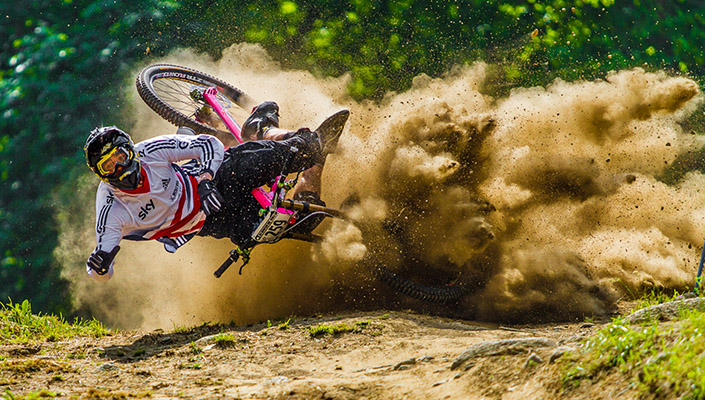Unfortunately, bikes and broken bones go hand in hand – particularly if you prefer to get a bit radical on the weekends. After falling off my bike and breaking my scaphoid in early November (doing a really difficult, ahem, gap jump), I was forced to spend a couple months healing up. During this time I started to think of ways I could return to the saddle more fit than ever, despite my arm being in a cast.
If you have been injured and told to stay off the bike, you’ll know that the first thing you do, aside from casting a pain stricken facial expression, is rack your brain to think of loopholes in your diagnosis. “Technically, the doctor said I couldn’t ride MY bike for 6 weeks. She didn’t say anything about Sam’s bike.” Regardless, here are my top 5 tips for staying fit, keeping your spirits up, and making sure that you don’t lose too many QOMs/KOMs in those 6-8 weeks out of the saddle.
Tips to stay in peak fitness despite injury
Diet adjustment. Especially if you are accustomed to riding a lot, you are going to need to adjust your diet to suit. Sorry to be the bearer of bad news, but 6 weeks is definitely enough time for the shorts and jerseys to appear to have shrunk a few sizes in the dryer. Use this opportunity to review your overall approach to nutrition if you want to... Or just, you know, eat less.
Keep moving. Sure, you might not be able to ride your (or any) bike for a month or two, but that doesn’t mean that there aren’t other ways to get an aerobic workout. If the arm is the offending body part, why not try body weight strength training, band exercises, deep stretching, hiking, or jogging? If you're dragging a leg, why not concentrate on your upper body, like your back and core.
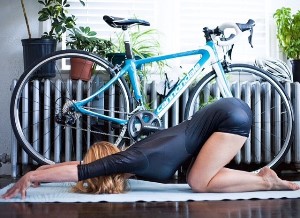
image: yogogirls.com
Get bendy. One of the top causes of injury in cyclists and triathletes is muscle strain due to compensation from an imbalance. Mostly, these imbalances are caused when we aren’t focusing on stretching and getting flexibility in our joints to withstand the activities we’re asking them to complete. Why not use the time in plaster to really focus on your flexibility? You will be surprised at how much progress you can make in 6-8 weeks! It will put you in a much better position to get riding again when the cast comes off.
Circulation. A cast sets a broken bone by keeping it completely still while it mends, however keeping a limb stationary can cause blood flow and circulation problems. If you have an arm in a cast, wiggle and exercise your fingers often to increase blood flow. If it’s a leg, same with the toes.
Volunteer. Yes, it was really hard to be missing out on events and races in the time I was in a cast, but one of the best things I did as make myself available for volunteering. Sitting at the registration desk, helping distribute and collect the race plates and staffing the feed zone – these are all ways you can help out and contribute to your local community while you heal. This contributes to your mental health, giving you the bike fix you so desperately need.
RELATED: Top 10 tips to training well
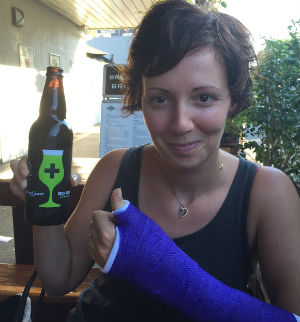
Keep in mind that your body is a system, and everything from your bones, ligaments, muscles, and mind are all working together to get you moving. Injury may cause you to not be able to use one part of the system, but thats no excuse to not use the rest of your body.
Injury time is a great time to work on other parts of your body that may normally be neglected. A broken wrist may stop you from gripping your bars, but it might give you the opportunity to focus on the flexibility of your always-sore-back. A system is only as strong as its weakest part.
Always make sure you listen to your doctor and be prepared for consequences if you choose to go outside their advice. Yes, they may err on the side of caution, but at the end of the day it’s all to make sure that you’re able to get back on your bike fully healed as soon as possible!
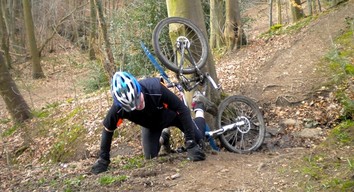
RELATED ARTICLE:
Mountain biking: What to do in an accident
Riding beyond your skill set? Went cartwheeling into the undergrowth...? Here's a list of things you should do in an accident situation... READ MORE
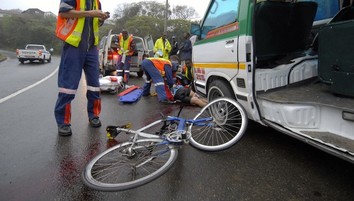
RELATED ARTICLE:
Road cycling: What to do in an accident
Risky overtake on a lose shoulder? Debris in your way...?Here's a list of things you should do if you've crashed on your road bike... READ MORE
